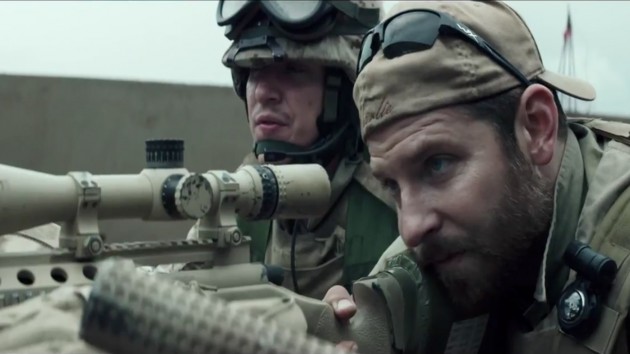American Sniper is one of the most grotesque films I’ve ever seen. A blatant piece of flag-waving Bush-era US propaganda, it’s a war movie where 100 dead Iraqis do not equate to one dead American. Where all brown people – children included – are enemies of ‘freedom’. Where the United States is a glossy land of BBQs, rodeos and pretty wives, and the Middle East is an “evil” pile of “dirt” populated by “savages”.
These are expressions used by US Navy Seal Chris Kyle (Bradley Cooper), a skilled sniper who, over a lengthy military career, racks up a body count in the hundreds from behind his rifle’s scope. The vitriol that casually comes from his mouth is never challenged, nor does he display any real empathy for the human beings who reside in the warzone he’s deployed in. Sitting through the film, I was left wondering if Kyle was really conveying the sentiments of director Clint Eastwood, despite the Hollywood legend’s well-known anti-war stance.
Presented as a true story, American Sniper is based on Kyle’s book of the same name. The accuracy with which the film has adapted the source material – and, indeed, the accuracy of the source material itself – has been intensely disputed, so viewers should go into the piece preparing themselves for more fiction than fact.
Having enlisted in the Navy, Kyle, and out-and-out Texan, is deployed to Iraq where he quickly builds a near-mythical reputation as a marksman to the point where soldiers feel invincible when he’s watching their backs. At home are Kyle’s new wife Taya (Sienna Miller) and his growing family, but the soldier struggles to reintegrate into normal life, and time-after-time he’s lured back to the battlefield, eventually racking up four tours over a number of years.
It would be wise of me, at this point, to say that all patriotic American films aren’t necessarily bad, nor are all Hollywood pictures depicting the county’s war on terror necessarily patriotic. Stop Loss was not a good film but did successfully shine light on the US military’s controversial stop-loss policy, while The Hurt Locker was an intense depiction of Iraq operations without being preachy or feeling of being driven by an agenda.
No recent films, however, have been as irresponsible as American Sniper. There are no blurred lines here – the Americans are the good guys, the Iraqis are the bad guys. Every bullet fired by Kyle is virtuous, saving US soldiers’ lives and protecting freedom, democracy and the American way. In his top pocket he carries a bible as a symbol of all that is righteous.
If the movie is to be believed, all US military activity in the country consisted of soldiers just being told to go out and kill as many locals as possible, and the plot soon descends into the cat-and-mouse battle between Kyle and a rival sniper (who seems to operate in the same small urban patch for years on end, somehow). This sniper’s motivations? Unspoken of. Innocent citizens whose lives have been ravaged by war? Practically non-existent. The only victims here are the dead or maimed Americans and, of course, Kyle himself, who suffers psychological scars from his experiences as the film winds to its ‘real battle’ – the one between the sniper and his demons.
The film’s ugly, ugly sentiment qualifies it as one of the worst I’ve ever seen, though no blame can be attributed to the technical team that worked on it. The combat scenes are visceral and gritty (though do become somewhat repetitive over the course of the film’s bloated 134 minute running time) and Eastwood is to be acknowledged for resisting the urge to take the easy path and turning the sniping sequences into a well-worn exercise in cranking up the cinematic tension. Cooper, meanwhile, is impressive as the tightly wound Kyle, though Miller does little but go through the repertoire of military wives’ reactions (“We might not be here when you get back this time”) without leaving much of an imprint.
American Sniper has been a huge hit at the US box office suggesting that there’s a hunger right now for material that makes people feel better about the oft-criticised Iraq War. Eastwood insistance that the film has no political stance would be laughable if not for his own political history muddying the waters. Regardless, his filmography has been stained by a truly horrid piece – one that makes you want to shake the 84-year-old and scream “It’s ok to feel bad for all the victims of war you know”! Dean Van Nguyen






